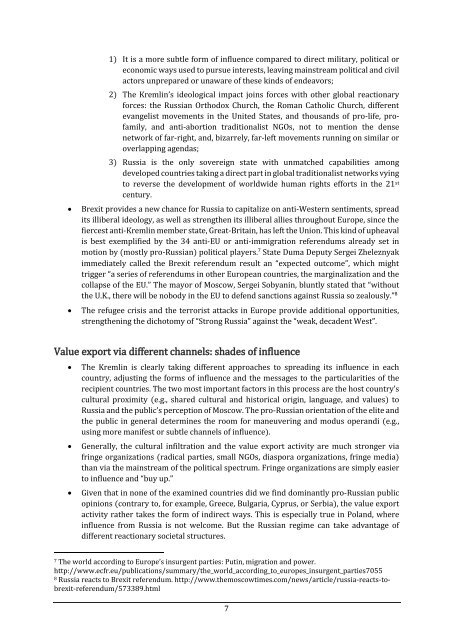to Central Europe
PC_reactionary_values_CEE_20160727
PC_reactionary_values_CEE_20160727
Create successful ePaper yourself
Turn your PDF publications into a flip-book with our unique Google optimized e-Paper software.
1) It is a more subtle form of influence compared <strong>to</strong> direct military, political or<br />
economic ways used <strong>to</strong> pursue interests, leaving mainstream political and civil<br />
ac<strong>to</strong>rs unprepared or unaware of these kinds of endeavors;<br />
2) The Kremlin’s ideological impact joins forces with other global reactionary<br />
forces: the Russian Orthodox Church, the Roman Catholic Church, different<br />
evangelist movements in the United States, and thousands of pro-life, profamily,<br />
and anti-abortion traditionalist NGOs, not <strong>to</strong> mention the dense<br />
network of far-right, and, bizarrely, far-left movements running on similar or<br />
overlapping agendas;<br />
3) Russia is the only sovereign state with unmatched capabilities among<br />
developed countries taking a direct part in global traditionalist networks vying<br />
<strong>to</strong> reverse the development of worldwide human rights efforts in the 21 st<br />
century.<br />
Brexit provides a new chance for Russia <strong>to</strong> capitalize on anti-Western sentiments, spread<br />
its illiberal ideology, as well as strengthen its illiberal allies throughout <strong>Europe</strong>, since the<br />
fiercest anti-Kremlin member state, Great-Britain, has left the Union. This kind of upheaval<br />
is best exemplified by the 34 anti-EU or anti-immigration referendums already set in<br />
motion by (mostly pro-Russian) political players. 7 State Duma Deputy Sergei Zheleznyak<br />
immediately called the Brexit referendum result an “expected outcome”, which might<br />
trigger “a series of referendums in other <strong>Europe</strong>an countries, the marginalization and the<br />
collapse of the EU.” The mayor of Moscow, Sergei Sobyanin, bluntly stated that “without<br />
the U.K., there will be nobody in the EU <strong>to</strong> defend sanctions against Russia so zealously.” 8<br />
The refugee crisis and the terrorist attacks in <strong>Europe</strong> provide additional opportunities,<br />
strengthening the dicho<strong>to</strong>my of “Strong Russia” against the “weak, decadent West”.<br />
Value export via different channels: shades of influence<br />
<br />
<br />
<br />
The Kremlin is clearly taking different approaches <strong>to</strong> spreading its influence in each<br />
country, adjusting the forms of influence and the messages <strong>to</strong> the particularities of the<br />
recipient countries. The two most important fac<strong>to</strong>rs in this process are the host country’s<br />
cultural proximity (e.g., shared cultural and his<strong>to</strong>rical origin, language, and values) <strong>to</strong><br />
Russia and the public’s perception of Moscow. The pro-Russian orientation of the elite and<br />
the public in general determines the room for maneuvering and modus operandi (e.g.,<br />
using more manifest or subtle channels of influence).<br />
Generally, the cultural infiltration and the value export activity are much stronger via<br />
fringe organizations (radical parties, small NGOs, diaspora organizations, fringe media)<br />
than via the mainstream of the political spectrum. Fringe organizations are simply easier<br />
<strong>to</strong> influence and “buy up.”<br />
Given that in none of the examined countries did we find dominantly pro-Russian public<br />
opinions (contrary <strong>to</strong>, for example, Greece, Bulgaria, Cyprus, or Serbia), the value export<br />
activity rather takes the form of indirect ways. This is especially true in Poland, where<br />
influence from Russia is not welcome. But the Russian regime can take advantage of<br />
different reactionary societal structures.<br />
7 The world according <strong>to</strong> <strong>Europe</strong>’s insurgent parties: Putin, migration and power.<br />
http://www.ecfr.eu/publications/summary/the_world_according_<strong>to</strong>_europes_insurgent_parties7055<br />
8 Russia reacts <strong>to</strong> Brexit referendum. http://www.themoscowtimes.com/news/article/russia-reacts-<strong>to</strong>brexit-referendum/573389.html<br />
7


